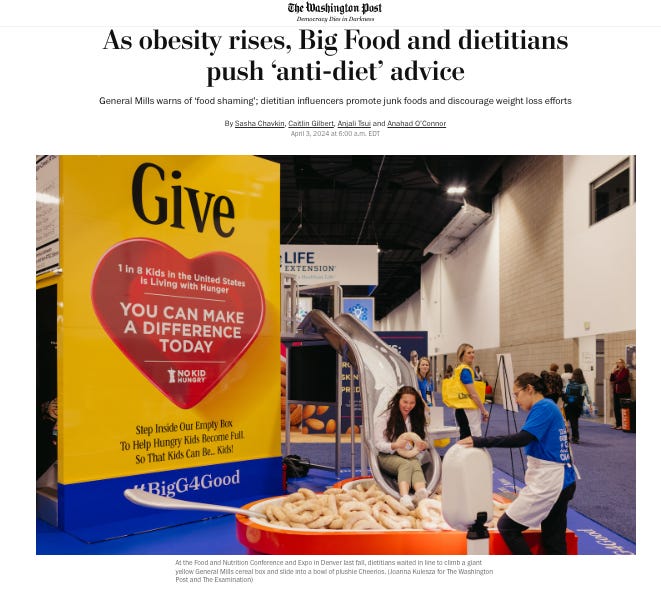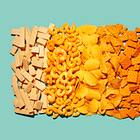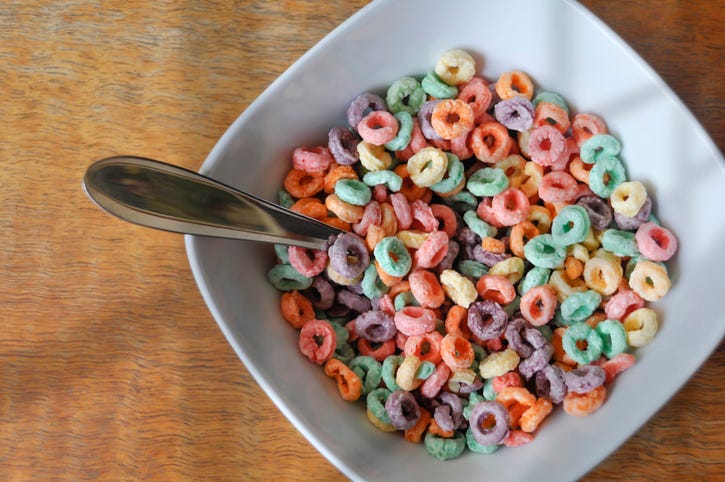Moral Panic! At the Cheerios Slide
Why The Washington Post thinks Big Food has corrupted the anti-diet movement.
Almost twenty years ago, I attended my first-ever nutrition conference as a wee young health editor for a now-defunct women’s magazine called Organic Style. The Food Nutrition Conference and Expo, better known as FNCE, was, and is still, hosted the Academy of Nutrition and Dietetics, the main professional association for dietitians. They bill FNCE as “the world’s largest meeting of food and nutrition experts,” where “RDNs, NDTRs, researchers, policymakers, health care providers and industry leaders” meet “to address key issues affecting the health of all Americans.”
The year I attended, FNCE was hosted in Anaheim, California, just across the street from Disneyland. I spent hours every day sitting in conference rooms, listening to researchers and dietitians present papers on the dangers of ob*sity and how to eat for weight loss. In between sessions, I walked the Expo floor, where every major food brand was standing by, ready to hand out swag and snacks. I took any free snack someone handed me, and carried reusable tote bags full of gluten-free cookies, whole grain crackers, and so many kinds of trail mix back to my hotel room to lay out my bounty.
At night, I went to dinner with a few other lady mag editors I knew loosely from New York, and their many dietitian friends. This was a world where “nutrition” was synonymous with “weight loss” and “healthy” automatically implied “thin.” I was not surprised when everybody ordered salads and just one dessert to share among the ten or so women at the table. But I was surprised when I started chatting with the various dietitians about their work, and discovered that they didn’t just spend their days counseling clients on how to eat. They were also consultants for a lot of the same brands I was seeing on the Expo floor—Kraft, General Mills, Stonyfield, the National Dairy Council, and PizzaHut.
Some of these dietitians sat in on recipe and product development meetings. Some wrote blogs for these brands’ still nascent websites about how to “eat healthy and lose weight” by incorporating more of whichever food group the brand sold. One emailed me immediately after the conference to suggest we work together on a story about how eating more dairy could help women lose weight. They all took media requests on behalf of the brands, talking to journalists especially when those brands came under fire for promoting ob*sity. And these dietitians were being paid to do this work.

Last week, the Washington Post published an article with the headline, “As Obesity Rises, Big Food and Dietitians Push ‘Anti-Diet Advice.” The story attempts to quantify how many dietitians who brand their work as “anti-diet” or pro-intuitive eating on Instagram, earn at least part of their living by creating sponsored content for the manufacturers of processed snack foods:
Online dietitians — many of them backed by food makers — also are building lucrative followings by co-opting anti-diet messages. Anti-diet hashtags, such as #NoBadFoods, #FoodFreedom and #DitchTheDiet, have proliferated on social media.
The Post and The Examination analyzed more than 6,000 social media posts by 68 registered dietitians with at least 10,000 followers. The analysis showed that roughly 40 percent of these influencers, with a combined reach of over 9 million followers, repeatedly used anti-diet language.
The majority of the influencers who used anti-diet language also were paid to promote products from food, beverage and supplement companies, the analysis found. The rapid spread of anti-diet messaging — and the alliance between some of the country’s registered dietitians and the food industry — has alarmed some in the public health community.
The Washington Post reported these findings in order to raise questions about the credibility of anti-diet dietitians like Cara Harbstreet, Colleen Christensen, and others. “The anti-diet approach essentially shifts accountability for the health crisis away from the food industry for creating ultra-processed junk foods laden with food additives, sugars and artificial sweeteners,” write the four reporters who shared the byline on this piece. One of them, Anahad O’Connor, is also the author of two diet books. From what I can tell online, none of them has lived experience as a fat person.
And what O’Connor and his colleagues forgot to mention is that the pro-weight loss approach to dietetics also works hard to shift accountability for America’s health away from the food industry. Dietitians of all philosophical stripes have been on food industry payrolls for a very, very long time. There are reasons to critique that practice and there are reasons to defend it. (We’re going to get into both.) But there is no reason to single out anti-diet folks as unique in their willingness to take marketing dollars from Big Food. And that’s just the beginning of what this piece gets wrong.
The story opens with Jaye Rochon, a 51-year-old from Wisconsin who says she embraced intuitive eating until her weight began to climb. There are details in her story that I bumped on — namely that she “grew to believe” that “listening to mental hunger meant that if she was thinking about a food, she should eat it,” which feels like an oversimplification of every explanation of intuitive eating I’ve ever heard. But I’m not in the business of telling fat people how to feel about food and their bodies.
I’ve also reported on these issues long enough to know that there are folks for whom the anti-diet messaging falls short for a whole variety of reasons. See
’s smart examination of its failures, namely: Anti-diet work can only go so far when that messaging comes primarily from thin, marketably attractive dietitians, who don’t have the lived experience of fat folks.But the decision to use Rochon as this story’s lede was a calculated choice. The journalists sought out her narrative because they wanted to confront us right away with a worst-case scenario: What if intuitive eating doesn’t work? What if being anti-diet makes you (gasp) fat?
This…isn’t actually a worse-case scenario though. Getting fatter happens to almost everyone who stops dieting. This can be because it’s normal to follow a period of food scarcity with food abundance. Getting fatter can happen because our bodies have been fighting to defend our bodies’ set points, and those often turn out to be higher than diet culture has taught us to accept. It can happen because years of weight fluctuations through dieting has pushed our set point higher than it initially was. And getting fatter can happen because life happens alongside whatever we’re doing with food — and maybe we’ve had a baby or changed jobs, or started menopause, or experienced any of the other myriad lifestyle shifts that can show up in our body size. Getting fatter can just happen. Body diversity is real.
That said: Rochon is entitled to not like getting fatter. It’s incredibly difficult to experience your body becoming more marginalized in a world built for thinness. And while the relationship between weight and health is far more complicated than O’Connor and his colleagues believe, Rochon is also allowed to make whatever decisions she wants in pursuit of health. but But Rochon’s experience is not representative of every person who gets fatter when they stop dieting. In leading the story with her perspective, the Washington Post team left no space to question their own biased premise: That fat is always bad.
The other major assumption that the story leaves unquestioned is: All processed food is also bad—yes, even cereal. We did a deep dive into the research on ultra-processed foods last summer with the help of
, so I’m not going to rehash that all today. But it is worth repeating that much of the discourse around ultra-processed foods, is steeped in anti-fatness, classism and other biases. Consider how differently we feel about a McFlurry and a smoothie made with organic protein powder, or a bag of Flaming Hot Cheetos and a bag of the cheese-flavored Brad’s Crunchy Kale Chips.There is a valid critique to be made about how the food industry has defied scrutiny and regulation on questions of nutritional content (as well as their working conditions and environmental impact). But those questions are not answered by critiquing folks’ individual food choices, which are so often limited by budget and access. Processed foods enable many of us to feed ourselves and our families within the constraints of time and budget. Cereal, which the Washington Post seemed oddly obsessed with in this story, is a great example of a processed food that provides easy, affordable nutrition to many of us, especially children.
The question of whether anti-diet dietitians should accept sponsorships from Big Food is more complicated. Someone with RD in their Instagram handle has trained first and foremost as a healthcare provider. Their advice about how to eat land quite differently from that of a civilian influencer who posts mostly about how she feeds her own family. Does being on the payroll make these dietitian-influencers less likely to hold these brands accountable for harm caused? Or does it help turn the tide on how diet culture has demonized these foods and even give influencers (at least those with the biggest platforms) more direct access and opportunity to advocate with brands for positive change?
The Washington Post piece spends a lot of time detailing General Mills’ #DerailTheShame campaign, which showcased the company’s research on the harm of “food shaming.” This kind of feel good PR blitz also gave the company some political cover while its lobbyists pushed back against legislation that would add more health information to product labels. But #DerailTheShame has hardly gone viral; on Instagram, the hashtag currently has about 250 posts, many of which are talking about the Washington Post story. I wasn’t aware of the campaign until I read this story, and I run one of the biggest independent anti-diet media outlets in the country and receive dozens of press releases every day from food and diet brands. As such, it’s unlikely that any of the dietitians promoting the campaign were paid huge sums of money to do it.
So I’ll continue to be more annoyed about the far more widespread and manipulative practice of food marketers to sell us diet culture, as I wrote a few years ago:
Consider that old campaign slogan for Pringles: “Once you pop, you can’t stop!” Or the way Milano Cookie #SaveSomething4U commercials teach us that the only time moms can eat cookies is when they are hiding from their family in a bathroom they should be cleaning. My Twitter followers came up with about a million more examples here if you want to fall down a rabbit hole. (Magnum relaunching their “Seven Deadly Sins” ice cream is maybe my favorite for sheer creepiness? But let’s not leave out Oreo packaging designed to help you hide them from your kids!) The point is that every one of these reinforces the myth that you should crave these foods because you’re not really allowed to have them—because you can’t control yourself around them.
If we are going to come down on anti-diet dietitians for working with big food brands, then let’s at least come down equally hard on diet influencers and pro-weight-loss dietitians for doing the same thing. Nutrition conferences, including FNCE, are attended by far more of those folks—so it wasn’t only anti-diet RDs sliding down the Cheerio box slide at their last conference. Should the field of dietetics be as fully enmeshed with the food industry as it has always been? Arguably not. But if that’s how the profession’s main organizing body has set it up, let’s not be mad that anti-diet folks are getting in that game. The median annual salary for a dietitian in 2023 was under $70,000 according to the Bureau of Labor Statistics. It’s a woman-dominated profession that doesn’t get anyone rich on client work alone, and the earning potential certainly declines if you aren’t offering weight loss services. (To say nothing of the far too many fat activists making content and doing other valuable work for free or extremely low pay.)
And let’s not mistake traditional diet messaging for any kind of underdog. If food marketers want to help spread anti-diet messaging, they’re going up against the combined marketing budgets and star power of Novo Nordisk and Oprah. These and other diet brands actively co-opt anti-diet rhetoric to sell weight loss all the time, without compensating any of their critics. Consider Noom, perpetually marketing itself as intuitive eating. And consider how Weight Watchers CEO Sima Sistani is now making reels about the need to end weight discrimination, while launching WW’s online clinic to sell weight loss drugs. And consider that General Mills itself owns Cocoa Puffs and Cinnamon Toast Crunch —both name-checked in the article as examples of unhealthy processed foods— as well as Fiber One, Larabar, Autumn’s Gold, and Good Measure, all of which might not be diet foods per se, but certainly are marketed as safe for dieters.
If the Washington Post wants to be mad about how the food industry puts dietitians on the payroll in order to co-opt health messaging, they missed a much larger story about the revolving door between the food industry and dietetics. But they didn’t tell that story because the industry influence isn’t really what they’re anxious about. These reporters set out to discredit anti-diet dietitians because they are anxious about fatness. They might frame that as being anxious about the health impacts of being fat. But if this was really about health, the article also would have explored the mental and physical health toll of dieting, disordered eating and eating disorders — all of which get far more viral traction on social media than anti-diet folks eating Cheerios. If this was really about health, O’Connor and his colleagues would have reckoned with the rising cost of cereal. They would have pondered the role processed foods can play in a healthy diet, and the systemic social barriers that keep us all from cooking more from scratch.
This article wasn’t about health and it wasn’t about Big Food. It was just four reporters ordering salads and splitting one dessert for the table, unable to imagine there might be another way.










I keep thinking about how gendered WaPo's outrage is. As you point out, the vast majority of dietitians are women, and the process of getting an RD is incredibly expensive so it really takes a lot of privilege or a lot of sacrifice/support to get there (would men readily enter a field that requires thousands of hours of *unpaid* internship time?).
Expectations around women's unpaid labor continue into the social media/influencer world where I guess WaPo believes professionals who've built large followings can continue putting out high-quality content for free? Where's the WaPo reporting on white male podcasters who get paid handily to promote unregulated supplements? (I'm looking at you, Smartless and Huberman.)
Then again, as you point out, they don't seem interested in investigating influencers of any gender who are pushing dangerous weight-loss content...
Also really enjoyed your description of FNCE. I presented there last year, and the exhibit hall was truly a diet culture house of horrors (but I did enjoy some free snacks!).
I finally read this article earlier today after side eyeing it in my inbox for days. It was... oddly desperate? I knew you had said you were going to write about it, which made me really happy after reading about it, and of course, your take lived up to my expectations.
The funny part about them demonizing Cinnamon Toast Crunch is that I was a kid on a strict diet when that cereal came out, and my aunt (the one who was restricting my food choices) decided it was too high in calories for me to eat. I was probably in my teens before I had an actual bowl of it, and it remains one of my favorite cereals.
But like so many foods that were once verboten to me, if I hadn't worked with an IE trained therapist who specialized in eating disorders (and who was herself very thin, white and upper middle class), I would not be able to just eat a bowl. I would either still be never allowing myself to have it, or I'd buy a box and eat it all in a few days, if that. Currently, I have one pouch that's been open for months and is probably stale sitting in my pantry.
I incredible oversimplification of IE in this piece was really irritating to me. Also, as you said, diet foods have been marketed to us so heavily for decades, so why is this some big news? Just because there's a fear of accepting fatness?
Anyway, thank you for taking this on. It was such a misinformed essay, but so badly done I found it almost hard to be mad. Almost.